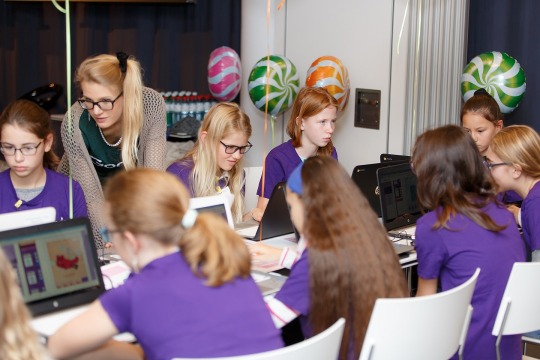Google sponsors 60 EU Code Week projects that introduce students to computer science
27/09/17
By Verónica Gebhardt, Google’s Computer Science Education Outreach Program Manager.
Across Europe digital skills are becoming essential to successful careers and to Europe’s future growth. Yet, despite the growing importance of having computer science skills there are not enough students who have access to opportunities to develop the technical skills they’ll need to be successful in the 21st century.

This is a topic that Google cares deeply about, and that’s why we are offering sponsorships again this year to organisations running initiatives to introduce students to computer science during Europe Code Week.
We received almost 500 applications from all across Europe which made it a tough selection process. Ultimately we were able to fund 60 initiatives in 33 countries, with a goal to reach over 30,000 students.
We are excited to see enthusiasm around inspiring students in computer science and to support these great efforts. Congratulations to the organisations listed below! We hope to see lots of follow up activities to keep Europe Code Week’s momentum going!
Albania: Open Labs Albania
Armenia: Enterprise Incubator Foundation (EIF)
Austria: Catrobat, and OLPC (Austria) Gesellschaft für Forschung und Entwicklung
Bosnia and Herzegovina: Youth Humanitarian Association of Pure Heart Prijedor
Belgium: Dwengo vzw
Bulgaria: High School of Mathematics and Science “Prof. Emanuil Ivanov”, and Panayot Volov Secondary School
Croatia: Primary school Popovaca
Cyprus: CARDET, Centre for the Advancement of Research and Development in Educational Technology and Cyprus Computer Society
Czech Republic: Czechitas, z.s.
Denmark: Coding pirates Skoedstrup
Estonia: Narva Paju school and Tabasalu Gymnasium
France: Ligue de l’enseignement – Fédération du Nord and Simplon.co
Germany: Lessing-Gymnasium Uelzen, RWTH Aachen University, Student Lab InfoSphere and Wesseling.Digital
Greece: Greek Computer Society | Macedonia-Thrace Chapter and Hellenic Association of Computer Engineers
Hungary: Informatikai, Távközlési és Elektronikai Vállalkozások Szövetsége, and Turai Hevesy György Általános Iskola
Ireland: Saint Eunan’s College, St. Mary’s Parish Primary School, North Dublin National School Project, St Vincent’s Secondary School and St. Joseph’s P.S.
Israel: Beit Yatziv Be’er Sheva
Italy: Istituto Comprensivo “Carrara e Paesi a monte”, Istituto Comprensivo di Carbonera (TV), Istituto Comprensivo Santa Venerina, Istituto Comprensivo “Giuseppe Taliercio” and Associazione DSchola Le scuole per le scuole
Lithuania: Association “Langas į ateitį”
Moldova: EDUCAT-TEKEDU
Netherlands: Stichting NewTechKids and Stichting VHTO
Norway: Gjøvik bibliotek og litteraturhus
Poland: Girls Code Fun Foundation and Polsko-Japońska Akademia Technik Komputerowych
Portugal: Association of Computer Science Teachers (ANPRI)
Romania: ETIC Association and NGO Asociația Segmente
Serbia: UPIS
Slovakia: GalaxyCodr
Slovenia: School Centre Nova Gorica and Institute for intergenerational cooperation Simbioza Genesis Ljubljana, social enterprise
Spain: IES Penyagolosa
Sweden: Luleå University of Technology
Switzerland: We Are Play Lab
Turkey: EVREN PAŞA İLK-ORTAOKULU, Payas STEM centre, Anabilim Eğitim Kurumları
Ukraine: “INNOVATION FUTURE”
United Kingdom: Kirklees Libraries (Kirklees Council), STEAM Co. CIC, ICT in Practice and Carr’s Glen Primary School
See our getting started guides in computer science for France, Germany, Ireland, Italy, Poland, Spain, Switzerland, and the UK now! For all other countries please visit edu.google.com/cs


